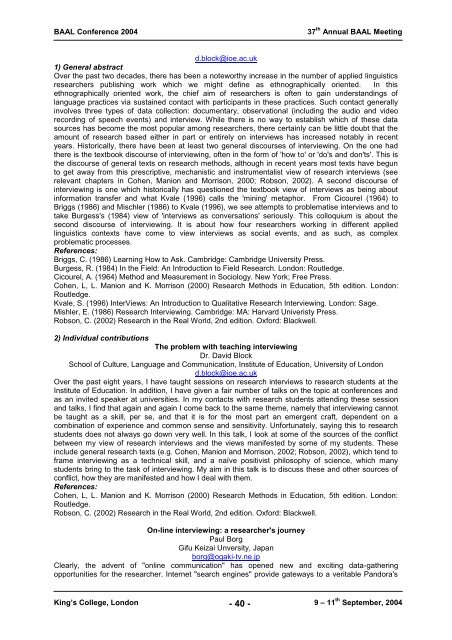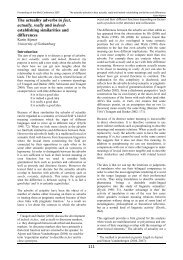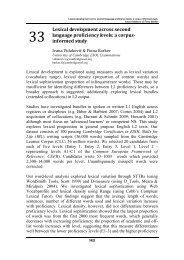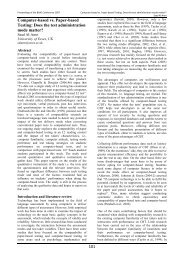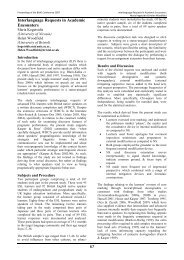Colloquia - British Association for Applied Linguistics
Colloquia - British Association for Applied Linguistics
Colloquia - British Association for Applied Linguistics
You also want an ePaper? Increase the reach of your titles
YUMPU automatically turns print PDFs into web optimized ePapers that Google loves.
BAAL Conference 2004 37 th Annual BAAL Meeting<br />
d.block@ioe.ac.uk<br />
1) General abstract<br />
Over the past two decades, there has been a noteworthy increase in the number of applied linguistics<br />
researchers publishing work which we might define as ethnographically oriented. In this<br />
ethnographically oriented work, the chief aim of researchers is often to gain understandings of<br />
language practices via sustained contact with participants in these practices. Such contact generally<br />
involves three types of data collection: documentary, observational (including the audio and video<br />
recording of speech events) and interview. While there is no way to establish which of these data<br />
sources has become the most popular among researchers, there certainly can be little doubt that the<br />
amount of research based either in part or entirely on interviews has increased notably in recent<br />
years. Historically, there have been at least two general discourses of interviewing. On the one had<br />
there is the textbook discourse of interviewing, often in the <strong>for</strong>m of 'how to' or 'do's and don'ts'. This is<br />
the discourse of general texts on research methods, although in recent years most texts have begun<br />
to get away from this prescriptive, mechanistic and instrumentalist view of research interviews (see<br />
relevant chapters in Cohen, Manion and Morrison, 2000; Robson, 2002). A second discourse of<br />
interviewing is one which historically has questioned the textbook view of interviews as being about<br />
in<strong>for</strong>mation transfer and what Kvale (1996) calls the 'mining' metaphor. From Cicourel (1964) to<br />
Briggs (1986) and Mischler (1986) to Kvale (1996), we see attempts to problematise interviews and to<br />
take Burgess's (1984) view of 'interviews as conversations' seriously. This colloquium is about the<br />
second discourse of interviewing. It is about how four researchers working in different applied<br />
linguistics contexts have come to view interviews as social events, and as such, as complex<br />
problematic processes.<br />
References:<br />
Briggs, C. (1986) Learning How to Ask. Cambridge: Cambridge University Press.<br />
Burgess, R. (1984) In the Field: An Introduction to Field Research. London: Routledge.<br />
Cicourel, A. (1964) Method and Measurement in Sociology. New York; Free Press.<br />
Cohen, L, L. Manion and K. Morrison (2000) Research Methods in Education, 5th edition. London:<br />
Routledge.<br />
Kvale, S. (1996) InterViews: An Introduction to Qualitative Research Interviewing. London: Sage.<br />
Mishler, E. (1986) Research Interviewing. Cambridge: MA: Harvard Univeristy Press.<br />
Robson, C. (2002) Research in the Real World, 2nd edition. Ox<strong>for</strong>d: Blackwell.<br />
2) Individual contributions<br />
The problem with teaching interviewing<br />
Dr. David Block<br />
School of Culture, Language and Communication, Institute of Education, University of London<br />
d.block@ioe.ac.uk<br />
Over the past eight years, I have taught sessions on research interviews to research students at the<br />
Institute of Education. In addition, I have given a fair number of talks on the topic at conferences and<br />
as an invited speaker at universities. In my contacts with research students attending these session<br />
and talks, I find that again and again I come back to the same theme, namely that interviewing cannot<br />
be taught as a skill, per se, and that it is <strong>for</strong> the most part an emergent craft, dependent on a<br />
combination of experience and common sense and sensitivity. Un<strong>for</strong>tunately, saying this to research<br />
students does not always go down very well. In this talk, I look at some of the sources of the conflict<br />
between my view of research interviews and the views manifested by some of my students. These<br />
include general research texts (e.g. Cohen, Manion and Morrison, 2002; Robson, 2002), which tend to<br />
frame interviewing as a technical skill, and a naïve positivist philosophy of science, which many<br />
students bring to the task of interviewing. My aim in this talk is to discuss these and other sources of<br />
conflict, how they are manifested and how I deal with them.<br />
References:<br />
Cohen, L, L. Manion and K. Morrison (2000) Research Methods in Education, 5th edition. London:<br />
Routledge.<br />
Robson, C. (2002) Research in the Real World, 2nd edition. Ox<strong>for</strong>d: Blackwell.<br />
On-line interviewing: a researcher's journey<br />
Paul Borg<br />
Gifu Keizai Unversity, Japan<br />
borg@ogaki-tv.ne.jp<br />
Clearly, the advent of "online communication" has opened new and exciting data-gathering<br />
opportunities <strong>for</strong> the researcher. Internet "search engines" provide gateways to a veritable Pandora's<br />
King‟s College, London 9 – 11 th - 40 -<br />
September, 2004


